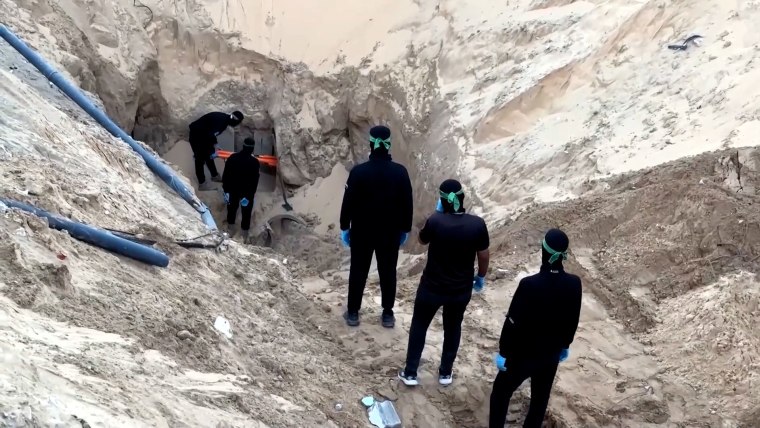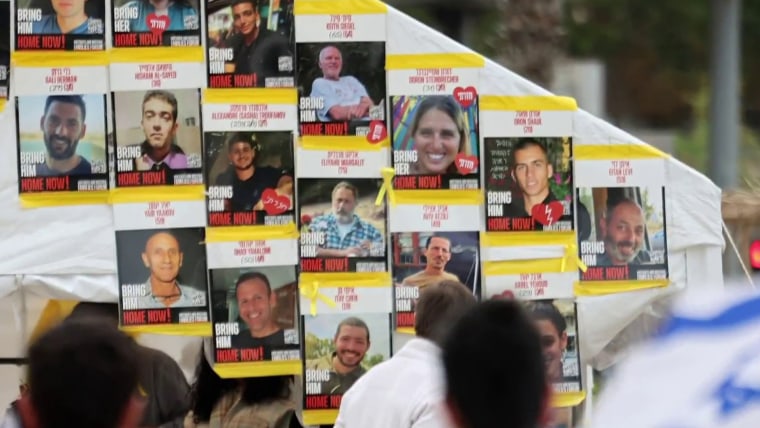The Israeli military carried out airstrikes in the Gaza Strip on Tuesday, according to local health officials, throwing the fragile U.S.-brokered ceasefire between Israel and Hamas into question.
Earlier Tuesday, Israeli Prime Minister Benjamin Netanyahu ordered "powerful" airstrikes on Gaza.
"Following security consultations, Prime Minister Netanyahu instructed the military echelon to carry out powerful strikes in the Gaza Strip immediately," his office said in a statement.
An official from the Israel Defense Forces told NBC News that the command is a result of Hamas' allegedly attacking soldiers in Rafah in an Israeli-controlled area.
NBC News has not independently verified the attack.
Airstrikes were carried out in Gaza City and Khan Younis, and aircraft had been seen in all of the strip, Gaza Civil Defense spokesperson Mahmoud Basal told NBC News. Airstrikes were also reported by Al Jazeera in east Deir al-Balah and the center of the Gaza Strip on Tuesday night local time.
In a statement, Hamas denied having any connection to the incident in Rafah, calling Israel’s strikes on Gaza “a flagrant violation” of the ceasefire deal. The group called on mediators to step in and pressure Israel to curb its attacks.
At least nine people have been killed and two others have been injured in Gaza as a result of Israeli airstrikes Tuesday night, Basal said. Four people were killed in an Israeli airstrike on a home in Gaza City, and five were killed when a civilian vehicle was targeted in Khan Younis, he said. The casualties from the vehicle include two children.
“The president achieved a historic peace in the Middle East. The ceasefire is holding. That doesn’t mean that there aren’t going to be little skirmishes here and there," Vice President JD Vance told a group of reporters Tuesday. "We know that Hamas or somebody else within Gaza attacked an IDF soldier. We expect the Israelis are going to respond, but I think the president’s peace is going to hold despite.”
An Israeli official told NBC News that Netanyahu was in touch with Jared Kushner, President Donald trump's son-in-law, who played a key role in hammering out the peace plan that led to the ceasefire, and that Israel did not consider Tuesday’s exchanges a violation of the ceasefire, the official said.
The White House did not reply to a request for comment on the latest Gaza strikes.
Netanyahu also said Tuesday that the remains of a hostage returned by Hamas overnight were body parts of another hostage who was recovered in Gaza by Israeli troops almost two years ago.
Under the truce was finalized on Oct. 10, Hamas is expected to return all Israeli hostage remains as soon as possible.
In a statement earlier Tuesday, Hamas' military wing, Al Qassam Brigades, said it had found the body of a hostage during a search in southern Gaza but will postpone returning it to Israel because of "violations." The return was originally scheduled for Tuesday.

Before Netanyahu's announcement, Hamas official Suhail al-Hindi told Al Jazeera that the group has faced difficulties recovering hostages' bodies and has asked Israel to approve the entry of heavy equipment, as well as permission for search teams to enter "red zones" to get the work done, which Israel allegedly refused. Al-Hindi also restated Hamas' commitment to the ceasefire agreement and accused Israel of falsely accusing the group of violating it.
Netanyahu's instructions come just weeks after Israel and Hamas agreed to the ceasefire. The deal led to the exchange of Israeli hostages and Palestinian prisoners and detainees and prompted high hopes that fighting would end.
The conflict in Gaza had raged largely uninterrupted since Oct. 7, 2023, after Hamas-led attacks killed 1,200 people in Israel and led to nearly 250 being taken hostage. Since then, Israeli forces have killed nearly 70,000 people in Gaza, according to local health officials, and devastated the enclave, leaving a vast majority of the population with inadequate access to food, shelter and medical care. Famine was declared in parts of Gaza in August.
In the weeks after the ceasefire deal, the Israeli military has struck Hamas “to eliminate the threat” posed by militants and “dismantle tunnel shafts and military structures used for terrorist activity.”
Hamas, meanwhile, has reasserted its control over parts of the enclave that Israel has withdrawn from — deploying armed police officers, clashing with rival clans, directly firing on and killing Israeli troops and carrying out at least one public execution.


